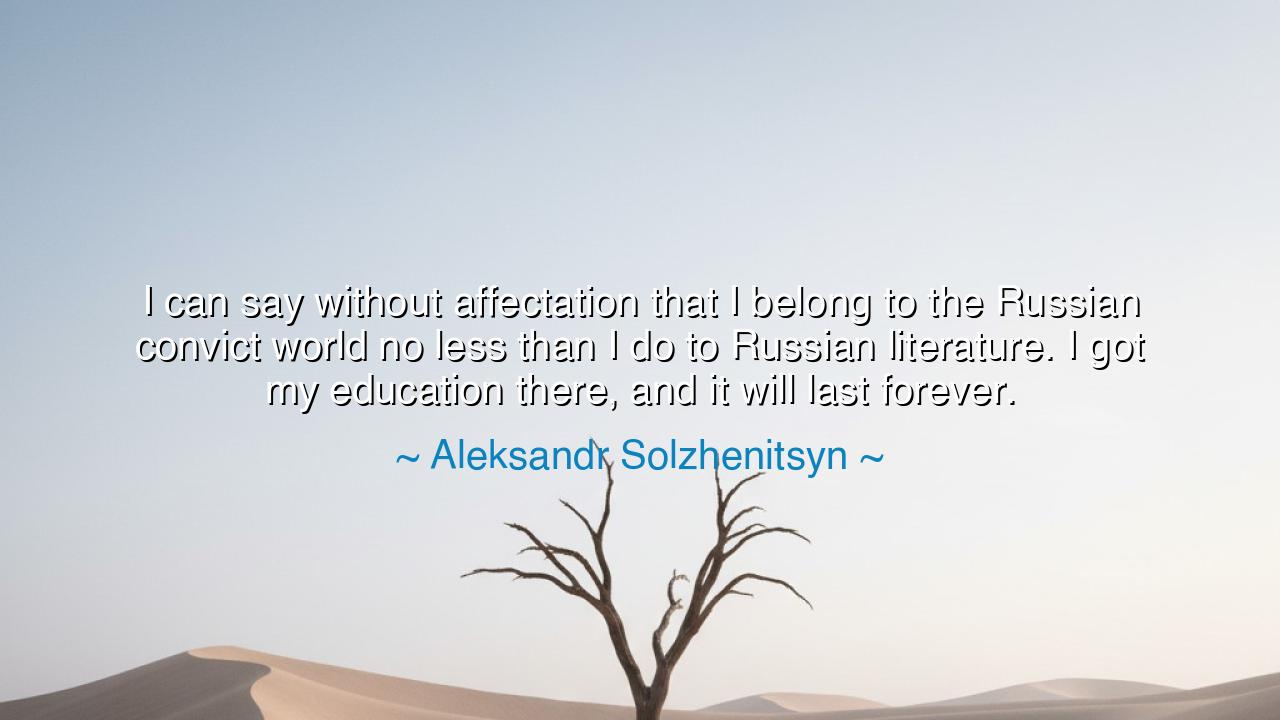
I can say without affectation that I belong to the Russian
I can say without affectation that I belong to the Russian convict world no less than I do to Russian literature. I got my education there, and it will last forever.






The great Russian writer and moral prophet Aleksandr Solzhenitsyn once wrote: “I can say without affectation that I belong to the Russian convict world no less than I do to Russian literature. I got my education there, and it will last forever.” These words were born not of pride, but of profound truth — the truth that suffering, when faced with courage and reflection, becomes its own education. Solzhenitsyn, who endured years of imprisonment in the brutal labor camps of the Soviet Gulag, speaks here as one who found wisdom not in comfort, but in chains. He reminds us that the deepest learning does not come from books or classrooms, but from the crucible of experience — from pain, endurance, and the discovery of the soul’s strength when all else is stripped away.
In the ancient world, the sages taught that adversity is the greatest teacher. The Stoic philosopher Epictetus, himself once a slave, declared that no man is free who is not master of himself. Solzhenitsyn’s life mirrors that same truth. Imprisoned by his own homeland for speaking the truth, he entered the camps as a soldier and scholar, but he emerged as a philosopher of the human spirit. In the cold, in the hunger, among the condemned and the broken, he received an education that no university could ever grant. He learned the anatomy of evil, the fragility of freedom, and the endurance of conscience. Out of this abyss he forged the book The Gulag Archipelago, a monumental work that opened the world’s eyes to the machinery of tyranny.
When Solzhenitsyn says he “belongs to the Russian convict world,” he is not speaking of guilt or criminality, but of solidarity — of the bond that suffering for truth creates among those who refuse to bow to lies. In the darkness of the camps, where cruelty reigned and hope flickered faintly, he found a paradoxical light. There, among the oppressed, he saw humanity stripped of illusion, where men’s true natures were revealed — some sinking into moral ruin, others rising into saintly endurance. This world of prisoners and guards, of shame and resilience, became his second homeland, and its lessons became eternal in his heart.
The education he gained there was not of arithmetic or rhetoric, but of character. It was an education in the moral anatomy of man. He learned that when stripped of everything — reputation, comfort, and freedom — a person is left with only one possession that no power can take: the inner decision to remain truthful. In his suffering, Solzhenitsyn came to understand that evil triumphs not because it is strong, but because good men grow weary. Thus, the Gulag became for him not merely a prison, but a monastery of awakening — a place where his soul learned the sacred art of endurance, forgiveness, and truth.
History abounds with others who received their greatest education in captivity or hardship. Nelson Mandela, imprisoned for twenty-seven years, once said that prison taught him patience, perspective, and compassion — qualities that later allowed him to heal a divided nation. Like Solzhenitsyn, Mandela discovered that the walls meant to break him instead became mirrors, revealing his truest self. In both men, we see the same paradox: that suffering refines the spirit more deeply than comfort ever could. The dungeon becomes a classroom, and pain becomes the tutor of wisdom.
Solzhenitsyn’s words also warn against the shallowness of modern understanding. He reminds us that true education cannot be purchased or standardized. It is not confined to institutions or diplomas, but born from the crucible of life. The one who has suffered and reflected knows truths that cannot be taught — the value of freedom, the cost of truth, the weight of silence. He learned, as all who suffer must, that knowledge without morality is useless, and intellect without conscience is dangerous. His education, he said, “will last forever,” because it was written not on paper, but upon the soul.
The lesson we must take is clear and humbling: wisdom is not given — it is earned through endurance. Do not flee from hardship, for within it lie the teachers of patience and courage. When the world turns against you, let your heart remain your compass. When pain arrives, greet it as the chisel that carves your character. Learn as Solzhenitsyn learned — to see truth even in oppression, to hold faith even in despair, and to transform suffering into strength.
So, my friends, remember this: the greatest education is not what the world gives you, but what the world takes from you — and what you learn in the empty spaces it leaves behind. Solzhenitsyn’s words endure because they reveal a law older than empires and deeper than philosophy — that from the darkness of the dungeon, the light of wisdom is born. Let us, then, honor our trials as the hidden schools of the spirit, and emerge from them not broken, but enlightened, knowing that the truest freedom is the mastery of one’s own soul.






AAdministratorAdministrator
Welcome, honored guests. Please leave a comment, we will respond soon